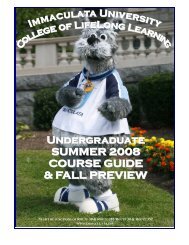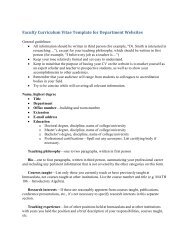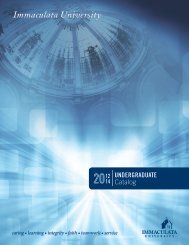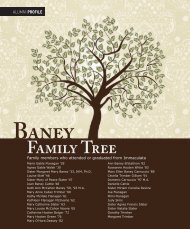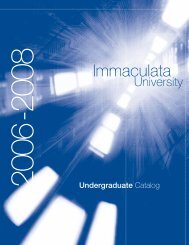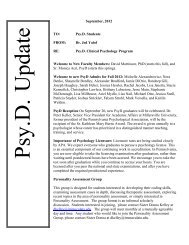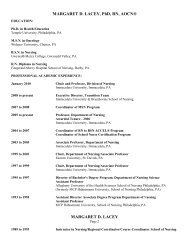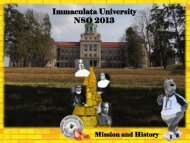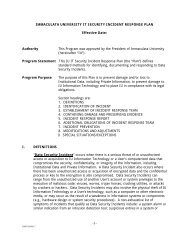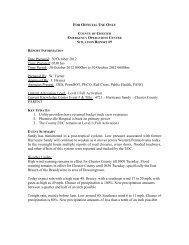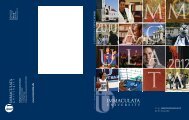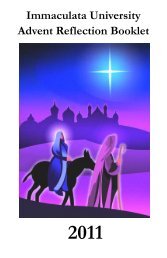Undergraduate Catalog 2008-2010 - Immaculata University
Undergraduate Catalog 2008-2010 - Immaculata University
Undergraduate Catalog 2008-2010 - Immaculata University
You also want an ePaper? Increase the reach of your titles
YUMPU automatically turns print PDFs into web optimized ePapers that Google loves.
and others, students will acquire understanding of basic<br />
philosophical vocabulary and concepts. In this one semester course,<br />
students will examine metaphysical, epistemological, aesthetical,<br />
and ethical themes which provide a firm foundation for further<br />
philosophical study.<br />
PHI 201 Stein and Phenomenology (1)<br />
The course introduces students to the life and work of Edith<br />
Stein, a German philosopher who studied under Edmund Husserl.<br />
Stein’s German, Jewish, feminist, Catholic, and Carmelite<br />
experiences are woven into the fabric of her philosophy. In this<br />
course, students are introduced to phenomenology and to Edith<br />
Stein as her life and works are explored. (See THE 200 ST)<br />
PHI 202 Stein’s Psychophysical Person (1)<br />
This course studies Edith Stein’s use of the phenomenological<br />
method to investigate how a human being understands the<br />
experiences of another person. Stein delves into the problem of how<br />
several persons experience the same phenomenon and how this<br />
experience impacts the sense of community. In this section,<br />
students will explore concepts of empathy and the psychophysical<br />
individual. (See THE 200 ST)<br />
PHI 203 Stein’s Essays on Women (1)<br />
This course focuses on Edith Stein’s interest in the human<br />
person and her determination to live a life committed to Christian<br />
principles. It also focuses on Stein’s public addresses to women,<br />
her critique of National Socialism, and her canonization. (See THE<br />
200 ST)<br />
PHI 204 Survey of Catholic Philosophy (3)<br />
Philosophy, based on reason, and theology, based on faith, seem<br />
to be divergent studies. However, Catholic philosophers have a long<br />
and fruitful history of contributing to philosophical discourse. This<br />
course examines how beliefs can relate to human reason. Texts<br />
from the Bible, Plato, Aristotle, the Patristic Age, the Middle Ages,<br />
the Renaissance through Nineteenth Century, and the Twentieth<br />
Century and beyond will highlight the richness of dialogue that<br />
exists between reason and faith.<br />
PHI 209 Logic and Knowledge (3)<br />
This course aims at both formal argument analysis and extended<br />
argumentation in topics that introduce the student to the different<br />
modes of thought employed in various disciplines with some<br />
particular attention to philosophic issues.<br />
PHI 214 HON: Ethics: Theory and Praxis (3)<br />
This course will benefit students planning careers in helping<br />
professions and those providing services to diverse populations.<br />
Foundations of the Western philosophical tradition regarding ethical<br />
concepts and human nature will be examined in the first part of the<br />
course, with special emphasis given to key thinkers. The second<br />
part will involve both examination and application of the process of<br />
ethical decision-making, with strong focus upon the types of current<br />
ethical issues that workers face. (See SOC 214)<br />
PHI 215 Edith Stein and Phenomenology (3)<br />
This course is an in-depth analysis of the life and work of Edith<br />
Stein, a German philosopher who studied under Edmund Husserl.<br />
Stein’s German, Jewish, feminist, Catholic, and Carmelite<br />
experiences are woven into the fabric of her philosophy. In this<br />
course, students are introduced to phenomenology and to Edith<br />
Stein. The life and works of Edith Stein are explored.<br />
PHI 220 Global Economic and Environmental Ethics (3)<br />
In this course, students consider ethical decisions as they relate<br />
to the environment and subsequently impact global economics. In<br />
studying the moral dilemmas concerning world energy and its<br />
economic influence, students become more aware of environmental<br />
and cultural ramifications. Students consider and work toward<br />
positive actions for a new world environment.<br />
PHI 309 Philosophy in History (3)<br />
A historical and thematic survey of the major issues and thinkers<br />
in Western philosophical tradition, beginning with ancient Greece<br />
and moving into the contemporary period. We use primary and<br />
secondary texts as a basis for articulating fundamental problems in<br />
epistemology, metaphysics, and ethics. Emphasis is placed on the<br />
historical and contextual nature of thinking, exploring the<br />
connection between systems of ideas and the world-views they<br />
present to us.<br />
PHI 312 Ethics (3)<br />
The study of ethics is concerned with action and the character of<br />
a person. In this course, students will read from primary sources,<br />
tracing key ethical theories as they developed throughout history.<br />
Using varied ethical theories, students will address contemporary<br />
problems.<br />
PHI 314 HON: Asian Thought (3)<br />
This course focuses on a study of major texts and thinkers in<br />
East Asian thought and religion, including a survey of Hinduism,<br />
Buddhism in India and China, and Chinese Confucianism and<br />
Daoism. Students will consider key concepts such as the nature of<br />
knowledge, social praxis, perception, language, reality, truth,<br />
illusion, self, society, and ethics as they participate in close readings<br />
of the texts, analysis, and commentary. Students will also compare<br />
Asian thought and practice with Western thought and traditions.<br />
(Meets cross-cultural studies requirement)<br />
PHI 324 Philosophy of Literature (3)<br />
Philosophy is often given voice in literature. While reading and<br />
analyzing traditional and popular literature, students will discover<br />
the relationship between literature and philosophy. Special<br />
emphasis will be placed on modern literature wherein students will<br />
discover recurring philosophical themes.<br />
PHI 326 Women Thinkers (3)<br />
This is an interdisciplinary course which examines issues<br />
surrounding women, gender, and knowledge. Our major focus will<br />
be philosophical analysis of the role of gender and the construction<br />
of knowledge in various theoretical frameworks, including<br />
literature, epistemology, psychoanalysis, and the multicultural<br />
milieu.<br />
PHI 328 Artificial Intelligence (3)<br />
A general introduction to artificial intelligence (AI) and<br />
philosophy of the mind that allows students to explore this topic<br />
from both the technical and philosophical perspectives. The<br />
underlying fundamental theories and representational structures in<br />
AI are covered. Students work with AI and survey current AI<br />
literature from both viewpoints. Students are challenged to consider<br />
consciousness, intelligence, robotics, and implications for the<br />
future. (Prerequisite: PHI 209 or PHI 309) (See CIS 328)<br />
PHI 329 Contemporary Philosophy (3)<br />
A thematic and developmental approach to contemporary<br />
continental thought with an emphasis on introducing the student to<br />
96



